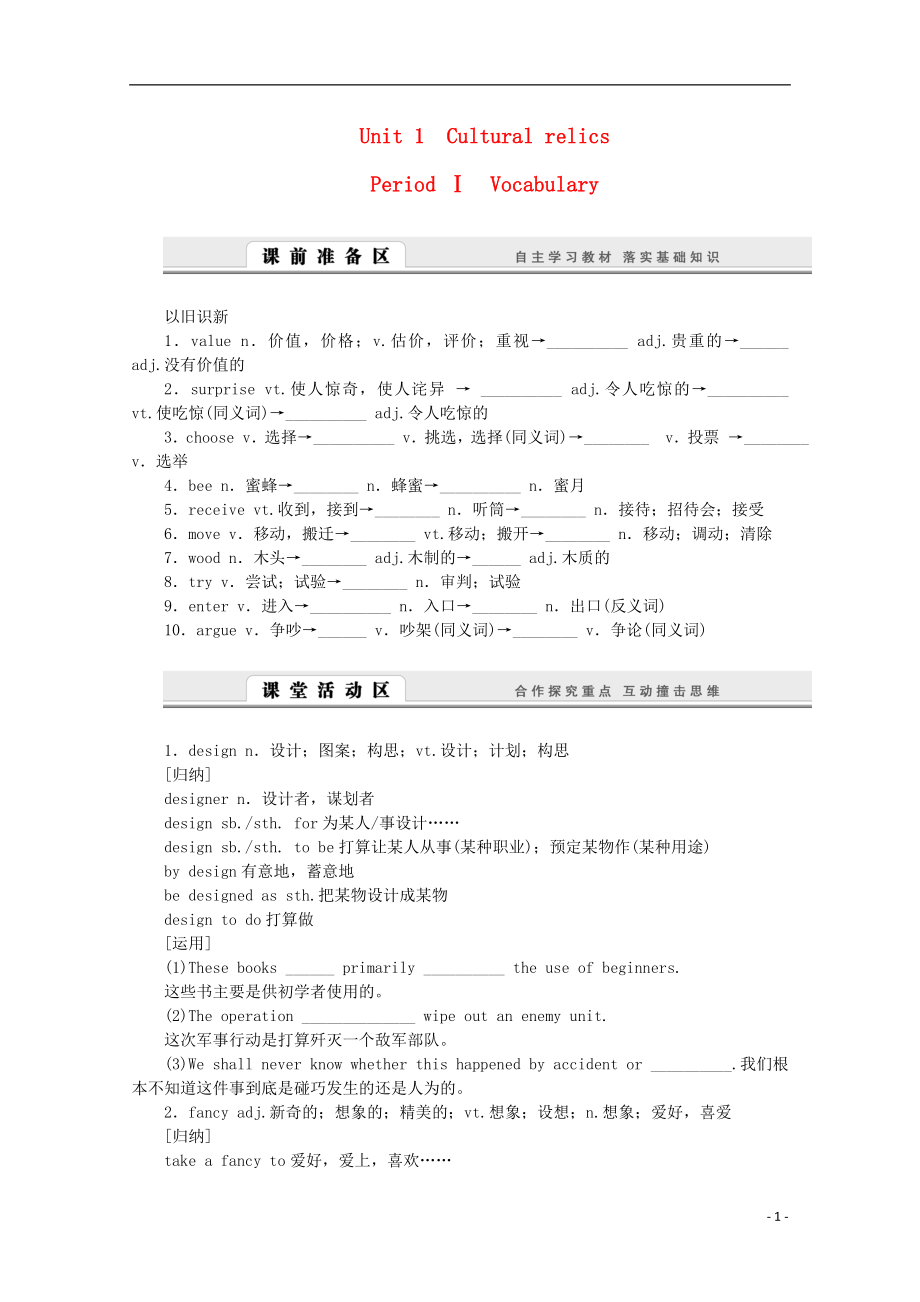《2016-2017學(xué)年高中英語(yǔ) Unit 1 Cultural relics Period Ⅰ Vocabulary學(xué)案 新人教版必修2》由會(huì)員分享�����,可在線閱讀�����,更多相關(guān)《2016-2017學(xué)年高中英語(yǔ) Unit 1 Cultural relics Period Ⅰ Vocabulary學(xué)案 新人教版必修2(4頁(yè)珍藏版)》請(qǐng)?jiān)谘b配圖網(wǎng)上搜索。
1����、
Unit 1 Cultural relics
Period Ⅰ Vocabulary
以舊識(shí)新
1.value n.價(jià)值,價(jià)格��;v.估價(jià)��,評(píng)價(jià)���;重視→__________ adj.貴重的→______ adj.沒(méi)有價(jià)值的
2.surprise vt.使人驚奇����,使人詫異 → __________ adj.令人吃驚的→__________ vt.使吃驚(同義詞)→__________ adj.令人吃驚的
3.choose v.選擇→__________ v.挑選���,選擇(同義詞)→________ v.投票 →________ v.選舉
4.bee n.蜜蜂→________
2���、n.蜂蜜→__________ n.蜜月
5.receive vt.收到,接到→________ n.聽(tīng)筒→________ n.接待����;招待會(huì)���;接受
6.move v.移動(dòng),搬遷→________ vt.移動(dòng)�����;搬開(kāi)→________ n.移動(dòng)��;調(diào)動(dòng)�;清除
7.wood n.木頭→________ adj.木制的→______ adj.木質(zhì)的
8.try v.嘗試;試驗(yàn)→________ n.審判����;試驗(yàn)
9.enter v.進(jìn)入→__________ n.入口→________ n.出口(反義詞)
10.a(chǎn)rgue v.爭(zhēng)吵→______ v.吵架(同義詞)→________ v.爭(zhēng)
3、論(同義詞)
1.design n.設(shè)計(jì)�;圖案;構(gòu)思����;vt.設(shè)計(jì)���;計(jì)劃����;構(gòu)思
[歸納]
designer n.設(shè)計(jì)者,謀劃者
design sb./sth. for為某人/事設(shè)計(jì)……
design sb./sth. to be打算讓某人從事(某種職業(yè))�����;預(yù)定某物作(某種用途)
by design有意地����,蓄意地
be designed as sth.把某物設(shè)計(jì)成某物
design to do打算做
[運(yùn)用]
(1)These books ______ primarily __________ the use of beginners.
這些書(shū)主要是供初學(xué)者使用的。
(
4����、2)The operation ______________ wipe out an enemy unit.
這次軍事行動(dòng)是打算殲滅一個(gè)敵軍部隊(duì)。
(3)We shall never know whether this happened by accident or __________.我們根本不知道這件事到底是碰巧發(fā)生的還是人為的�。
2.fancy adj.新奇的;想象的���;精美的���;vt.想象;設(shè)想�;n.想象;愛(ài)好���,喜愛(ài)
[歸納]
take a fancy to愛(ài)好���,愛(ài)上��,喜歡……
be full of fancies異想天開(kāi)���,充滿(mǎn)幻想
fancy sb./sb.’s doin
5、g sth.想象某人做某事
have a fancy that感到��;揣想����;總覺(jué)得要
fancy yourself 自負(fù);自命不凡
fancy yourself (as)/sth.自認(rèn)為是
[運(yùn)用]
(1)We cannot __________ without electricity.
我們不能設(shè)想沒(méi)有電的生活���。
(2)____________ she saw someone���,but there was no one there.
她覺(jué)得好像看見(jiàn)一個(gè)人,但是那兒并沒(méi)有人��。
(3)What do you ____________ supper?
晚飯你喜歡吃什么�����?
(4)_
6����、___________ you! I am surprised!
想不到會(huì)見(jiàn)到你!真是出乎意料�����!
3.doubt n.懷疑���;疑惑����;vt.懷疑����;不信
[歸納]
be in doubt不肯定地;不確定
without/beyond doubt毫無(wú)疑問(wèn)���;的確
no doubt無(wú)疑����;確實(shí)地
There is no doubt about sth.對(duì)某事有把握
注意:(1)doubt作動(dòng)詞時(shí)
①在肯定句中接whether/if引導(dǎo)的賓語(yǔ)從句��。
②在否定句、疑問(wèn)句中后跟that引導(dǎo)的賓語(yǔ)從句���。
(2)doubt作名詞時(shí)
①在肯定句中接whether引導(dǎo)的同位語(yǔ)從句�。
②在否定句中
7���、用that引導(dǎo)同位語(yǔ)從句����。
[運(yùn)用]
(1)I ________________ he will succeed.
我相信他會(huì)成功的�。
(2)He __________________ they would give him another chance to have a try.
他不能肯定他們是否會(huì)再給他一次機(jī)會(huì)讓他試一試。
(3)I ______________________ he can finish the task on time.
我相信他能按時(shí)完成這項(xiàng)任務(wù)����。
(4)Do you ______________ she will succeed?
你不能肯定她
8、會(huì)成功嗎���?
4.worth adj.[古]值錢(qián)的��;n.價(jià)值�����;作用�����;prep.值得的�����;相當(dāng)于……的價(jià)值
[辨析]
worth/worthwhile/worthy
(2)worthwhile adj.值得的���,既可作表語(yǔ)又可作定語(yǔ),作定語(yǔ)時(shí)��,意為“有價(jià)值的”��。
It is worthwhile to do/doing...
(3)worthy adj.值得�,有價(jià)值的,既可作表語(yǔ)又可作定語(yǔ)����,作定語(yǔ)時(shí),意為“可敬的”����。
[運(yùn)用]
(1)The problem discussed just now __________________________.
剛才討論的那個(gè)問(wèn)題值得
9、注意���。
(2)Try to spend your time just on the things you find ________.
A.worth doing them
B.worth being done
C.worthy of doing them
D.worthy of being done
(3)There was nearly five thousand dollars’ ________ of goods in the shop����,now burnt into ashes.
A.worth B.price
C.value D.prize
10、
5.in search of sb./sth.尋找某人/某物
[歸納]
search sb./sth.搜身/搜查某人/某物
search for sb./sth.搜尋某人/某物
search...for sb./sth.為了找某人/某物而搜查……
search sth./sb.out找出�;搜尋到
make a search of搜查
[運(yùn)用]
(1)Bad weather is hampering the __________ survivors.
惡劣的天氣妨礙了對(duì)幸存者的搜尋。
(2)Detectives are out ____________________ c
11����、lues.
偵探們出動(dòng)去搜查院子以尋找線索。
(3)They went to Australia ________________ gold.
他們?nèi)グ拇罄麃喬越稹?
6.in return作為報(bào)答����,作為回報(bào)
[歸納]
in return for...作為對(duì)……的回報(bào)
on one’s return在某人回來(lái)的時(shí)候
make a return作報(bào)告;作匯報(bào)
return to oneself蘇醒�;醒悟
[運(yùn)用]
(1)I bought him a tenspeed bike ____________ his help.
為酬謝他的幫助,我給他買(mǎi)了一輛十速自行車(chē)��。
(2
12����、)He is always ready to help others. ____________,he is liked by everyone.
他總是樂(lè)于助人��。作為回報(bào)�,每個(gè)人都喜歡他����。
(3)He met his brother ______________ from Italy.
從意大利回來(lái)的時(shí)候����,他遇見(jiàn)了他兄弟。
7.take apart拆開(kāi)����;嚴(yán)厲抨擊
[歸納]
take away取走����;消除
take down記下,寫(xiě)下�����;拆掉
take in接受�;吸入;理解���;欺騙���;包括
take off起飛�;脫下
take on呈現(xiàn)���;雇用
[運(yùn)用]
(1)_________
13�、_____ the watch and see what’s wrong with it.
把表拆開(kāi)看看哪里出問(wèn)題了��。
(2)I forgot to __________ my makeup last night.
昨天晚上我忘了卸妝�����。
(3)The tour __________ six European capitals.
這次旅游包括了歐洲六個(gè)國(guó)家的首都����。
答案詳解
Unit 1 Cultural relics Period Ⅰ Vocabulary
課前準(zhǔn)備區(qū)
1.valuable;valueless 2.surprising���;amaze���;amazing
3.se
14、lect����;vote;elect 4.honey���;honeymoon
5.receiver��;reception 6.remove���;removal
7.wooden�����;woody 8.trial
9.entrance�;exit 10.quarrel���;debate
課堂活動(dòng)區(qū)
1.(1)are designed for (2)was designed to
(3)by designs
2.(1)fancy a life (2)She fancied (3)take a fancy to (4)Fancy seeing
3.(1)have no doubt that (2)had his doubts whether (3)don’t doubt that (4)doubt that
4.(1)is worth paying attention to (2)D (3)A
5.(1)search for (2)searching the yard for
(3)in search of
6.(1)in return for (2)In return (3)on his return
7.(1)Take apart (2)take off (3)takes in
- 4 -
 2016-2017學(xué)年高中英語(yǔ) Unit 1 Cultural relics Period Ⅰ Vocabulary學(xué)案 新人教版必修2
2016-2017學(xué)年高中英語(yǔ) Unit 1 Cultural relics Period Ⅰ Vocabulary學(xué)案 新人教版必修2

